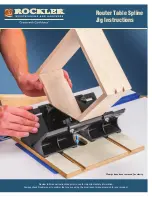
5
Before Each Use
Inspect your sander. Check for:
• alignment of moving parts,
• binding of moving parts,
• broken or damaged parts,
• work parts that cause a gap larger
than 1/16" between work support
and sanding surface,
• sanding belt narrower than 4 inches.
Narrower belts uncover parts that
could trap your fingers,
• worn or damaged electric cords,
• stable mounting, and
• any other conditions that may affect
the way the sander works.
• Remove adjusting keys and
wrenches. Form a habit of checking
for and removing keys and adjusting
wrenches from table top before turn-
ing sander on.
If any part is missing, bent, or broken
in any way, or any electrical parts
don’t work properly, turn the sander
off and unplug the sander. Replace
damaged, missing, or failed parts
before using the sander again.
Disconnect the sander to reduce
the risk of injury from accidental start-
ing. Turn switch off, unplug sander
and remove the switch key before
changing the setup or sanding drum.
Maintain tools with care. Keep the
sander clean for maximum and safest
performance.
To reduce the risk of injury from
jams, slips or thrown pieces:
• Use only recommended accessories.
• Use the correct spacer ring insert.
The opening between the sanding
sleeve and insert must be 5/32 of an
inch or less. (See page 15)
• All sanding drums, washers and
knobs are tight. No parts should
have excessive play prior to operat-
ing unit.
• Keep work area clean. Cluttered
work surfaces invite accidents. Floor
must be clean and dry for stable
footing.
Plan Ahead To Protect Your Eyes, Hands, Face and Ears
Dress for Safety
• Any power sander can throw foreign
objects into the eyes. This can result
in permanent eye damage. Always
wear safety goggles, not glasses
complying with ANSI Z87.1 (or in
Canada CSA Z94.3-99) shown on
package. Everyday eyeglasses
have only impact resistant lenses.
They are not safety glasses. Safety
goggles are available at many local
retail stores. Glasses or goggles not
in compliance with ANSI or CSA
could seriously hurt you when they
break.
• Sanding operations are usually
dusty. Wear a dust mask along with
the safety goggles.
• Wear nonslip footwear.
• Tie back long hair.
• Roll long sleeves above the elbow.
• Noise levels vary widely. To reduce
the risk of possible hearing damage,
wear ear plugs or muffs when using
sander for hours at a time.
Содержание EB4424
Страница 1: ...OSCILLATING EDGE BELT SPINDLE SANDER ...
Страница 35: ...35 Notes ...






































